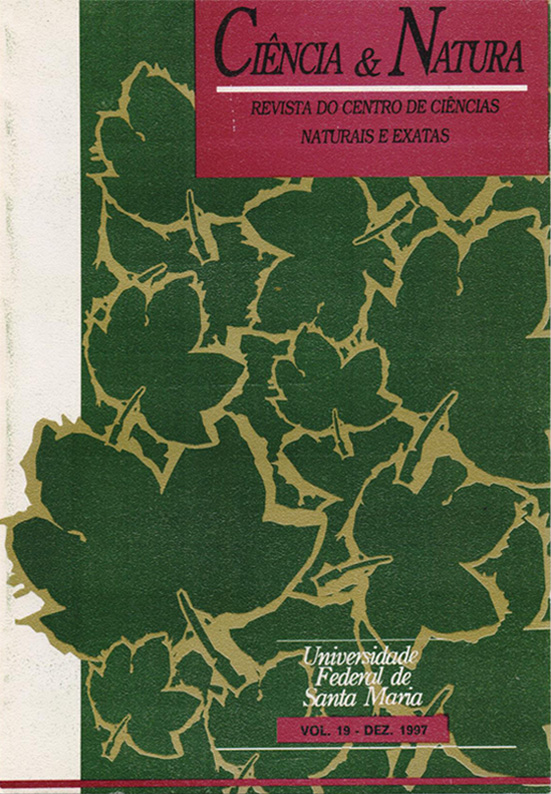Estudo dos riscos geológicos na região do município de Santa Maria: o caso da Vila Billbiu
DOI:
https://doi.org/10.5902/2179460X26812Abstract
The density of urban population with socio-spacial segregation in its most different manifestations on the use and occupation of the natural space, associated to an intensive exploitation of the environment and of the real estate speculation, determines the occupation of inadequate place dwellings by the less favoured social layers. Santa Maria city doesn't escape from this juncture, with Bilibiu village as the place where man and nature conflicts are intensified. In this region earthflows and debris flows occur on the steep areas; on the Vacacaí-Mirim river brook nearest areas the most important event is the flood. Besides this fact, the garbage accumulation in inadequate places and the pluvial and the sewer wastewater treatment are diseases and harmful animals dissemination sources.Downloads
References
FILHO, C.L. Maciel. Carta de condicionantes à ocupação de Santa MariaRS. 1990. escala 1:25.000, ed. UFSM.
_______________. Mapeamento Geotécnico Planejamento Da Ocupação Urbana De Santa Maria, RS. Dpto. de Geociências da Universidade Federal de Santa Maria, s.d.,1990. Escala 1:25.000. ed. UFSM.
LIMA, S.R.O. Diagnose e Prognose da Vila Bilibiu Santa Maria, RS. Dpto. de Geociências, CCNE, UFSM, 1994, p.44. In. Trabalho de graduação B, CCNE, UFSM, Inédito.
MILTON SANTOS. A Urbanização Brasileira. Editora HUCITEC, São Paulo, 1993, pg.155.
SCHIMIDT, MARCUS V.C. et aI. Relações Histórico-Florísticas, Fitossociologia e Aspectos Ecológicos Do Alecrim (Holocalyx balansae mich) Em Floresta Primárias Na Região De Formigueiro -RS. Ciência e Natura, SM, 15: 161-183, Dpto de Ciências Florestais - CCR, UFSM, SM, RS,1993.
TABARELLI, M.. Flora Arbórea Da Floresta Estacional Baixo-Montana No Município de Santa Maria Rio Grande Do Sul, Brasil. In: Anais do II Congresso Nacional sobre Essências Nativas, 1992, pg.260-268.
Downloads
Published
How to Cite
Issue
Section
License
To access the DECLARATION AND TRANSFER OF COPYRIGHT AUTHOR’S DECLARATION AND COPYRIGHT LICENSE click here.
Ethical Guidelines for Journal Publication
The Ciência e Natura journal is committed to ensuring ethics in publication and quality of articles.
Conformance to standards of ethical behavior is therefore expected of all parties involved: Authors, Editors, Reviewers, and the Publisher.
In particular,
Authors: Authors should present an objective discussion of the significance of research work as well as sufficient detail and references to permit others to replicate the experiments. Fraudulent or knowingly inaccurate statements constitute unethical behavior and are unacceptable. Review Articles should also be objective, comprehensive, and accurate accounts of the state of the art. The Authors should ensure that their work is entirely original works, and if the work and/or words of others have been used, this has been appropriately acknowledged. Plagiarism in all its forms constitutes unethical publishing behavior and is unacceptable. Submitting the same manuscript to more than one journal concurrently constitutes unethical publishing behavior and is unacceptable. Authors should not submit articles describing essentially the same research to more than one journal. The corresponding Author should ensure that there is a full consensus of all Co-authors in approving the final version of the paper and its submission for publication.
Editors: Editors should evaluate manuscripts exclusively on the basis of their academic merit. An Editor must not use unpublished information in the editor's own research without the express written consent of the Author. Editors should take reasonable responsive measures when ethical complaints have been presented concerning a submitted manuscript or published paper.
Reviewers: Any manuscripts received for review must be treated as confidential documents. Privileged information or ideas obtained through peer review must be kept confidential and not used for personal advantage. Reviewers should be conducted objectively, and observations should be formulated clearly with supporting arguments, so that Authors can use them for improving the paper. Any selected Reviewer who feels unqualified to review the research reported in a manuscript or knows that its prompt review will be impossible should notify the Editor and excuse himself from the review process. Reviewers should not consider manuscripts in which they have conflicts of interest resulting from competitive, collaborative, or other relationships or connections with any of the authors, companies, or institutions connected to the papers.







